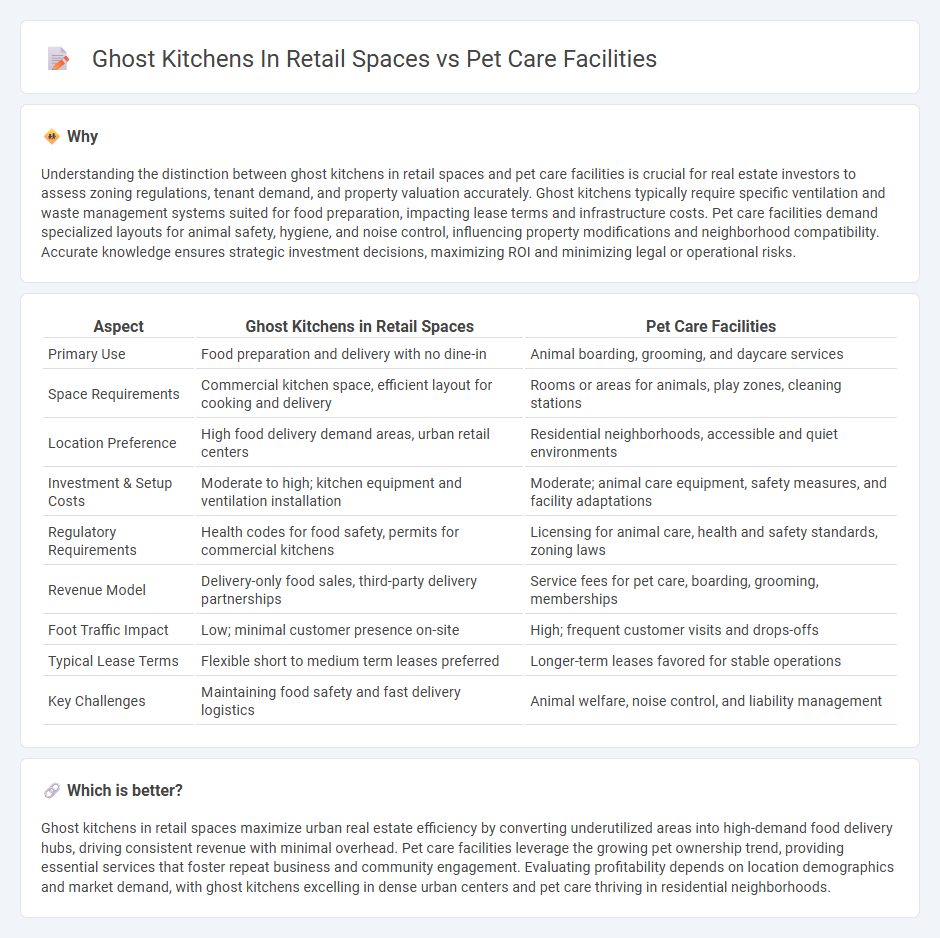
Ghost kitchens in retail spaces optimize underutilized areas, providing efficient food delivery operations without the need for traditional storefronts, thus maximizing rental income for property owners. Pet care facilities offer specialized amenities and services tailored to pet owners, often requiring customized layouts and compliance with health regulations, enhancing tenant appeal in niche markets. Explore how these emerging trends can reshape real estate investment strategies and property management approaches.
Why it is important
Understanding the distinction between ghost kitchens in retail spaces and pet care facilities is crucial for real estate investors to assess zoning regulations, tenant demand, and property valuation accurately. Ghost kitchens typically require specific ventilation and waste management systems suited for food preparation, impacting lease terms and infrastructure costs. Pet care facilities demand specialized layouts for animal safety, hygiene, and noise control, influencing property modifications and neighborhood compatibility. Accurate knowledge ensures strategic investment decisions, maximizing ROI and minimizing legal or operational risks.
Comparison Table
| Aspect | Ghost Kitchens in Retail Spaces | Pet Care Facilities |
|---|---|---|
| Primary Use | Food preparation and delivery with no dine-in | Animal boarding, grooming, and daycare services |
| Space Requirements | Commercial kitchen space, efficient layout for cooking and delivery | Rooms or areas for animals, play zones, cleaning stations |
| Location Preference | High food delivery demand areas, urban retail centers | Residential neighborhoods, accessible and quiet environments |
| Investment & Setup Costs | Moderate to high; kitchen equipment and ventilation installation | Moderate; animal care equipment, safety measures, and facility adaptations |
| Regulatory Requirements | Health codes for food safety, permits for commercial kitchens | Licensing for animal care, health and safety standards, zoning laws |
| Revenue Model | Delivery-only food sales, third-party delivery partnerships | Service fees for pet care, boarding, grooming, memberships |
| Foot Traffic Impact | Low; minimal customer presence on-site | High; frequent customer visits and drops-offs |
| Typical Lease Terms | Flexible short to medium term leases preferred | Longer-term leases favored for stable operations |
| Key Challenges | Maintaining food safety and fast delivery logistics | Animal welfare, noise control, and liability management |
Which is better?
Ghost kitchens in retail spaces maximize urban real estate efficiency by converting underutilized areas into high-demand food delivery hubs, driving consistent revenue with minimal overhead. Pet care facilities leverage the growing pet ownership trend, providing essential services that foster repeat business and community engagement. Evaluating profitability depends on location demographics and market demand, with ghost kitchens excelling in dense urban centers and pet care thriving in residential neighborhoods.
Connection
Ghost kitchens in retail spaces and pet care facilities share a strategic use of underutilized commercial real estate to maximize revenue streams. Both concepts leverage flexible zoning and modular designs, enabling property owners to adapt spaces quickly to evolving market demands. This efficient space optimization enhances profitability while meeting increasing consumer trends in food delivery and pet services.
Key Terms
Zoning regulations
Zoning regulations significantly differ between pet care facilities and ghost kitchens in retail spaces, impacting their operational feasibility and compliance requirements. Pet care facilities often face stricter zoning rules due to concerns about noise, waste management, and animal welfare, requiring specific permits in commercial or mixed-use zones. Explore detailed zoning laws and their implications to determine the best approach for your retail space investment.
Lease agreements
Lease agreements for pet care facilities in retail spaces typically emphasize compliance with health and safety regulations, specialized utility requirements like water and waste management, and modifications for animal welfare. Ghost kitchens prioritize flexible lease terms that accommodate high-volume cooking equipment, efficient ventilation systems, and 24/7 operational hours with minimal customer interaction. Discover more about how these distinct lease considerations impact retail space opportunities and investment returns.
Ventilation requirements
Pet care facilities require advanced ventilation systems to control odors, airborne pathogens, and maintain air quality for animal health, often needing specialized filtration like HEPA filters. Ghost kitchens prioritize ventilation focused on smoke, grease, and heat extraction, complying with commercial kitchen codes to ensure safety and odor control in confined retail spaces. Explore comprehensive guidelines to optimize ventilation design for both pet care and ghost kitchen environments.
Source and External Links
Wooflands Pet Care Center - McMurray, PA - Offers luxury dog boarding, grooming, and daycare with enrichment activities and personalized care in a highly recommended accredited facility near Pittsburgh.
Mountaineer Pet Care Center - Provides over 35 years of comprehensive dog and cat boarding, daycare, and grooming services in a state-of-the-art center for the tri-state area, with inclusive care including love, exercise, and treats.
Wheeling Veterinary Associates/Glen Dale Animal Hospital Boarding - Offers boarding services with high standards of care and cleanliness; professional, trained staff ensure pets' comfort and well-being with personalized feeding and attention in Wheeling, WV.
 dowidth.com
dowidth.com